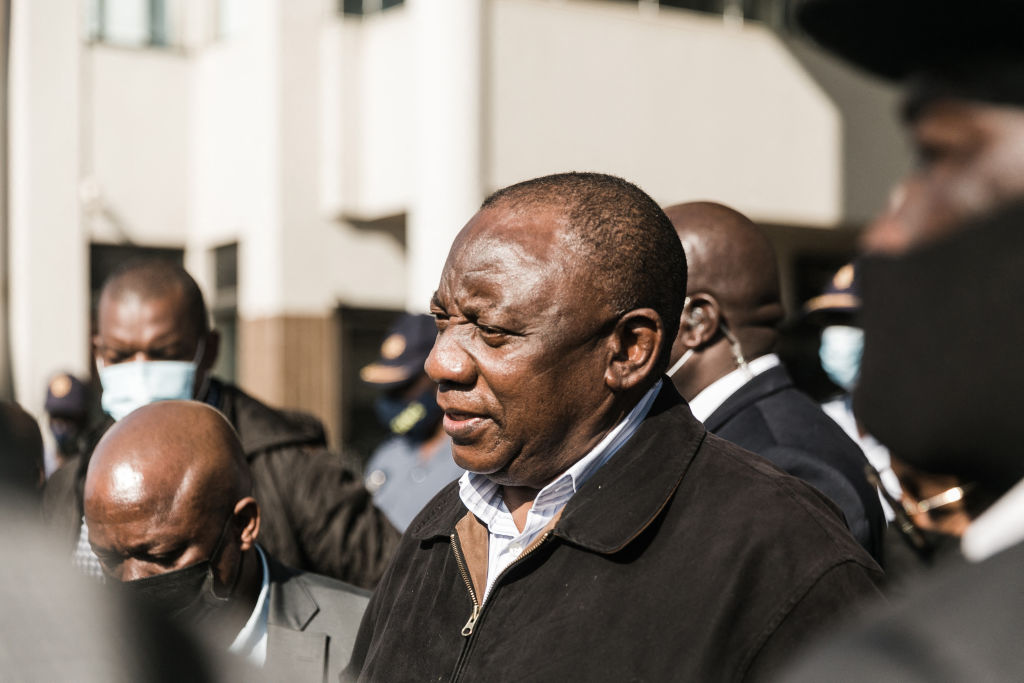- Monday, April 28, 2025

By: Pooja Shrivastava
SOUTH African president Cyril Ramaphosa said on Friday (16) he would not allow “anarchy and mayhem” to prevail and suggested that a wave of looting and arson that has destroyed hundreds of businesses had been deliberately provoked.
Rioting broke out in several parts of the country following the jailing of Ramaphosa’s predecessor, Jacob Zuma, last week for his failure to appear at a corruption inquiry.
Ramaphosa said his government was doing all it could to deal with the unrest that has killed more than 100 people in the past week.
ALSO READ: South Africa: India-origin doctor writes to Indian news outlet for help
“We will not allow anarchy and mayhem,” Ramaphosa said. He added that it was quite clear the incidents were “instigated” and “we are after these people”. Ramaphosa did not specify whom.
He also expressed concern about rising racial tensions in some parts of the country. Some white minority and Indian communities – who are generally better off than the black community – had armed themselves to fight off rioters.
South Africa: Racial tension prevails in Durban township
In Durban’s Phoenix neighbourhood, home to many south Africans of Indian descent, authorities reported conflict between them and black citizens.
In a visit to Durban on Friday, Ramaphosa applauded ordinary people for “standing up not only to defend their own assets but… also defending our democracy, because they can see that this is an assault on the democratic situation.”
“There are ugly scenes playing out on the streets of Phoenix, the racial direction that these unrests are taking must be arrested speedily,” police minister Bheki Cele said.
Twenty people have been killed in Phoenix since the start of the violence last week, he later said on television.
India’s foreign minister S Jaishankar on Wednesday (14) spoke to his South African counterpart Naledi Pandor who assured him her government was working to enforce law and order and an early restoration of normalcy.
‘Appreciate the conversation with South African Foreign Minister Naledi Pandor today. She assured that her government was doing utmost to enforce law and order. Early restoration of normalcy and peace was the overriding priority,’ Jaishankar said on Twitter.
Since looting erupted on July 9, many neighbourhoods have mobilised to defend homes, businesses and infrastructure against looters.
The military has called up all its reservists to bolster the army and police, with a total of 25,000 troops available to go to flashpoints.
In Phoenix, young men of south Asian heritage brandished handguns and machetes at their checkpoint, where they said they deterred troublemakers.
But the group has been accused of racism and mistreatment – of wrongly barring individuals from the area simply for being black – and others have been criticised for vigilante justice.
“We are not racist,” insisted Karim Loven, the head of a local policing forum.
“If you see the media they’re saying that it was a racial thing, whoever is saying this is racial, they are talking nonsense,” he said.
“We stood out here to protect our families.”
The hashtag #PhoenixMassacre trended on social media by Thursday (15), with some users alleging excessive use of force by members of the ethnic Indian population.
At a Phoenix roadblock, one masked community member manning the improvised checkpoint said bluntly: “If you’re looting, we’re shooting, because we’ve got nothing to eat”.
“It’s caused a lot of strain on the community,” said balaclava-clad Trevin Bramduth, an armed employee of a private security firm called KZN VIP Protection, who was deployed to the area.
“Everyone is actually scared to leave their homes. A lot of people have obviously lost their jobs as well.”
South Africans of Indian origin make up just 2.6 per cent of the country’s 59 million people, according to official statistics, with a high concentration in and around Durban.
Indians make up 85 per cent of the population in Phoenix.
“Our shopping centre has been looted and it’s burned down, right down,” said Karim.
“At the moment we are protecting this complex here, this one food chain Save Right, and protecting the garage. This is the only place that now we are getting food.”
Around the township, the shells of burnt-out vehicles hinted at the violence that had gripped the area 25 km (16 miles) northwest of downtown Durban.
Nearby one resident loaded a vintage shotgun as a bystander implored “put the safety on!”
Private security companies like Bramduth’s are part of a vast industry which along with vigilantes quickly stepped in once the police began to falter in the face of widespread anarchy.
There have been numerous allegations of beatings and other mistreatment of suspected rioters and looters at the hands of individuals and security firms.
“I live in this area as well, which is not safe at all,” said Bradmuth.
At Diepkloof Mall in Soweto, South Africa’s biggest township, about 50 people swept up broken glass and packed empty shoe boxes into plastic rubbish bags, a Reuters reporter said.
Clothing stores were empty and looted ATM machines lay strewn around.
“It’s heartbreaking … Everything is gone. It’s going to take months to be back up again,” said Ricardo Desousa, manager of a ransacked butcher shop in Soweto’s Bara Mall.
His staff were helping clean up the damage. “They’re not going to get paid,” he said. “There’s no money.”
The destruction of businesses is likely to exacerbate the poverty and desperation that partly fuelled the riots.